Details

Trends in Computational Nanomechanics
Transcending Length and Time ScalesChallenges and Advances in Computational Chemistry and Physics, Band 9
|
309,23 € |
|
| Verlag: | Springer |
| Format: | |
| Veröffentl.: | 14.03.2010 |
| ISBN/EAN: | 9781402097850 |
| Sprache: | englisch |
| Anzahl Seiten: | 620 |
Dieses eBook enthält ein Wasserzeichen.
Beschreibungen
<P>Trends in Computational Nanomechanics reviews recent advances in analytical and computational modeling frameworks to describe the mechanics of materials on scales ranging from the atomistic, through the microstructure or transitional, and up to the continuum. The book presents new approaches in the theory of nanosystems, recent developments in theoretical and computational methods for studying problems in which multiple length and/or time scales must be simultaneously resolved, as well as example applications in nanomechanics.</P>
<P>This title will be a useful tool of reference for professionals, graduates and undergraduates interested in Computational Chemistry and Physics, Materials Science, Nanotechnology.</P>
<P>This title will be a useful tool of reference for professionals, graduates and undergraduates interested in Computational Chemistry and Physics, Materials Science, Nanotechnology.</P>
Hybrid Quantum/Classical Modeling of Material Systems: The “Learn on the Fly” Molecular Dynamics Scheme.- Multiscale Molecular Dynamics and the Reverse Mapping Problem.- Transition Path Sampling Studies of Solid-Solid Transformations in Nanocrystals under Pressure.- Nonequilibrium Molecular Dynamics and Multiscale Modeling of Heat Conduction in Solids.- A Multiscale Methodology to Approach Nanoscale Thermal Transport.- Multiscale Modeling of Contact-Induced Plasticity in Nanocrystalline Metals.- Silicon Nanowires: From Empirical to First Principles Modeling.- Multiscale Modeling of Surface Effects on the Mechanical Behavior and Properties of Nanowires.- Predicting the Atomic Configuration of 1- and 2-Dimensional Nanostructures via Global Optimization Methods.- Atomic-Scale Simulations of the Mechanical Behavior of Carbon Nanotube Systems.- Stick-Spiral Model for Studying Mechanical Properties of Carbon Nanotubes.- Potentials for van der Waals Interaction in Nano-Scale Computation.- Electrical Conduction in Carbon Nanotubes under Mechanical Deformations.- Multiscale Modeling of Carbon Nanotubes.- Quasicontinuum Simulations of Deformations of Carbon Nanotubes.- Electronic Properties and Reactivities of Perfect, Defected, and Doped Single-Walled Carbon Nanotubes.- Multiscale Modeling of Biological Protein Materials – Deformation and Failure.- Computational Molecular Biomechanics: A Hierarchical Multiscale Framework With Applications to Gating of Mechanosensitive Channels of Large Conductance.- Out of Many, One: Modeling Schemes for Biopolymer and Biofibril Networks.
<P></P>
<P>Dr. Traian Dumitrica received a doctorate in physics from Texas A&M University in 2000. Since then he has worked at Rice University, Freie Universitaet Berlin, and Universitaet Kassel. He joined the University of Minnesota faculty in 2005. His research focuses in understanding the mechanical properties of materials using atomistic computational methods. System of interest include carbon nanotubes, silicon nanoparticles, and coherent phonons in semiconductors. <BR></P>
<P>Dr. Traian Dumitrica received a doctorate in physics from Texas A&M University in 2000. Since then he has worked at Rice University, Freie Universitaet Berlin, and Universitaet Kassel. He joined the University of Minnesota faculty in 2005. His research focuses in understanding the mechanical properties of materials using atomistic computational methods. System of interest include carbon nanotubes, silicon nanoparticles, and coherent phonons in semiconductors. <BR></P>
<P>Situated at the intersection of Computational Chemistry, Solid State Physics, and Mechanical Engineering, Computational Nanomechanics has emerged as a new interdisciplinary research area that has already played a pivotal role in understanding the complex mechanical response of the nano-scale. Many important nanomechanical problems concern phenomena contained in the microscopic or the continuum phenomenological scale. Thus, they can be simulated with traditional computational approaches, such as molecular dynamics (for the microscopic scale) and finite elements (for the continuum scale). More recently, significant advances in computational methodologies have made it possible to go beyond the distinct approaches mentioned above. By seamlessly linking the previously separated discipline methodologies, multi-scale aspects of the behaviour of nano-materials can now be simulated and studied from both fundamental and engineering-application viewpoints. </P>
<P><EM>Trends in Computational Nanomechanics: Transcending Length and Time Scales</EM> reviews recent results generated via the application of individual or blended microscopic (from ab initio to tight binding to empirical force field) and continuum modeling techniques. It illustrates the significant progresses and challenges in developing multi-scale computational tools that aim to describe the nanomechanical response over multiple time scales and length scales ranging from the atomistic, through the microstructure or transitional, and up to the continuum, as well as the tremendous opportunities in using atomistic-to-continuum nanomechanical strategies in the bio-materials arena. </P>
<P><EM>Trends in Computational Nanomechanics: Transcending Length and Time Scales</EM> is a useful tool of reference for professionals, graduates, and undergraduates interested in Computational Chemistry and Physics, Materials Science, and Engineering.</P>
<P><EM>Trends in Computational Nanomechanics: Transcending Length and Time Scales</EM> reviews recent results generated via the application of individual or blended microscopic (from ab initio to tight binding to empirical force field) and continuum modeling techniques. It illustrates the significant progresses and challenges in developing multi-scale computational tools that aim to describe the nanomechanical response over multiple time scales and length scales ranging from the atomistic, through the microstructure or transitional, and up to the continuum, as well as the tremendous opportunities in using atomistic-to-continuum nanomechanical strategies in the bio-materials arena. </P>
<P><EM>Trends in Computational Nanomechanics: Transcending Length and Time Scales</EM> is a useful tool of reference for professionals, graduates, and undergraduates interested in Computational Chemistry and Physics, Materials Science, and Engineering.</P>
Presents recent developments in theoretical and computational methods for studying problems in which multiple length and/or time scales must be simultaneously resolved Includes example applications in nanomechanics The only review volume to summarize important research efforts involving multi-scale methods and the solution of mutli-scale problems

















